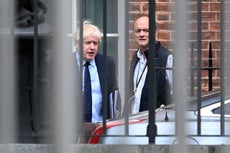Labour has ramped up pressure on Boris Johnson as the prime minister’s former chief of staff prepared to tell the inside story of the deadly delays to Britain’s coronavirus lockdown.
In a parliamentary showdown scheduled for Wednesday, Dominic Cummings is expected to hold the prime minister responsible for tens of thousands of avoidable Covid deaths by being too slow to act.
A shadow minister on Sunday night told The Independent that Mr Johnson should be “nervous” about the hearing, adding: “Cummings has a responsibility to come clean.”
As allies of Mr Cummings briefed that he is ready to “napalm” Mr Johnson’s administration, ministers were rushed onto television on Sunday morning to get early denials in.
The home secretary, Priti Patel, denied suggestions by Mr Cummings that the government originally tried to pursue a “herd immunity” strategy in response to Covid-19, saying this was “absolutely” not true.
The ex-chief of staff had on Saturday bombarded social media with a long thread alleging incompetence and “lies” from the government over the issue.
The former top Downing Street aide said the media had failed to properly scrutinise the government and instead “parroted” its claims to have never advocated the approach, despite evidence to the contrary.
He also lashed out at his former colleagues in government and claimed that the country could have avoided the need for lockdowns had it had “the right preparations and competent people in charge”.
But Ms Patel told the BBC: “Our strategy was always about protecting public health, saving lives and protecting the NHS.
“Absolutely all colleagues involved in those meetings and discussions, working with the chief scientist and the chief medical officers, absolutely recognised that from the very difficult discussions that we had.”
Also speaking on Sunday, former deputy chief medical officer Jenny Harries says she had never heard herd immunity discussed as a strategy.
“I’ve never been in a government meeting where herd immunity was put forward as a method of control,” she said, adding that she was not in all meetings.
Anticipating the committee hearing, Justin Madders, Labour’s shadow health minister, told The Independent: “Boris Johnson will be nervously awaiting Dominic Cummings’s appearance before MPs this week, and rightly so.
“From delays locking down to failing to secure our borders, the prime minister’s mistakes have had tragic consequences.
“Cummings has a responsibility to come clean to ensure the same mistakes cannot be made again.”
The former chief of staff is expected to elaborate with more detail about his claims at the joint meeting of the Commons health and technology committees on Wednesday.
Despite previously being a central part of Boris Johnson’s administration, enmity between Mr Cummings and the government has grown since his departure in November.
Months of silence from the former adviser turned to riotous anger in April after No 10 sources blamed Mr Cummings for leaking the prime minister’s texts.
The former Vote Leave strategist hit back hard, denying the claims and dropping several other related and unrelated bombs on the government operation.
He accused the PM of a “mad and totally unethical” scheme to get Tory donors to pay for a Downing Street flat refurbishment, and claimed Mr Johnson had refused to accept a leak inquiry to protect a friend of Ms Symonds.
He will be appearing at a session titled Coronavirus: Lessons Learnt, and is expected to accuse Mr Johnson of being responsible for excess deaths during the pandemic.
Britain has suffered one of the worst death rates in the world from Covid-19, with repeated delays and dithering over the introduction of lockdown measures blamed.
In a 5 March 2020 interview, Boris Johnson said there was “a need to strike a balance” in imposing restrictions that would flatten the peak of the pandemic to reduce strain on the NHS but allow “the disease, as it were, to move through the population”.
UK news in pictures
Show all 50
The government’s chief scientific advisor Sir Patrick Vallance told the BBC at the time: “If you suppress something very, very hard, when you release those measures it bounces back and it bounces back at the wrong time.”
He added: “Our aim is to try to reduce the peak, broaden the peak, not suppress it completely. Also, because the vast majority of people get a mild illness, to build up some kind of herd immunity so more people are immune to this disease and we reduce the transmission, at the same time we protect those who are most vulnerable to it.”
At a press conference a week later, on 12 March, Sir Patrick added: “Our aim is not to stop everyone getting it, you can’t do that. And it’s not desirable, because you want to get some immunity in the population. We need to have immunity to protect ourselves from this in the future.”
He later told MPs that herd immunity, through simply letting the virus rip through the population, was never the plan for the pandemic response.









